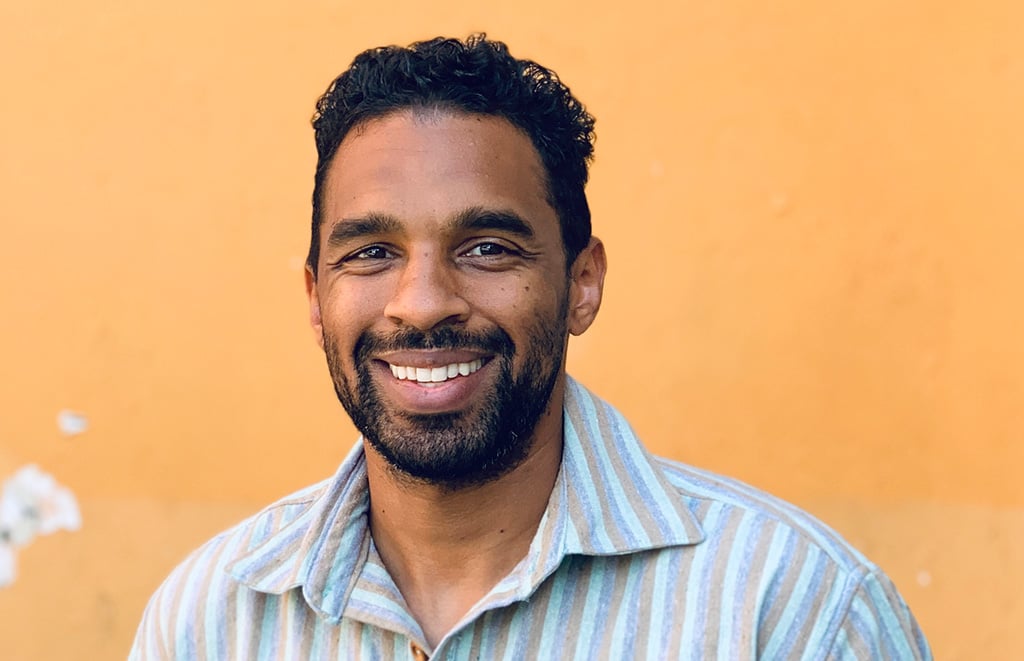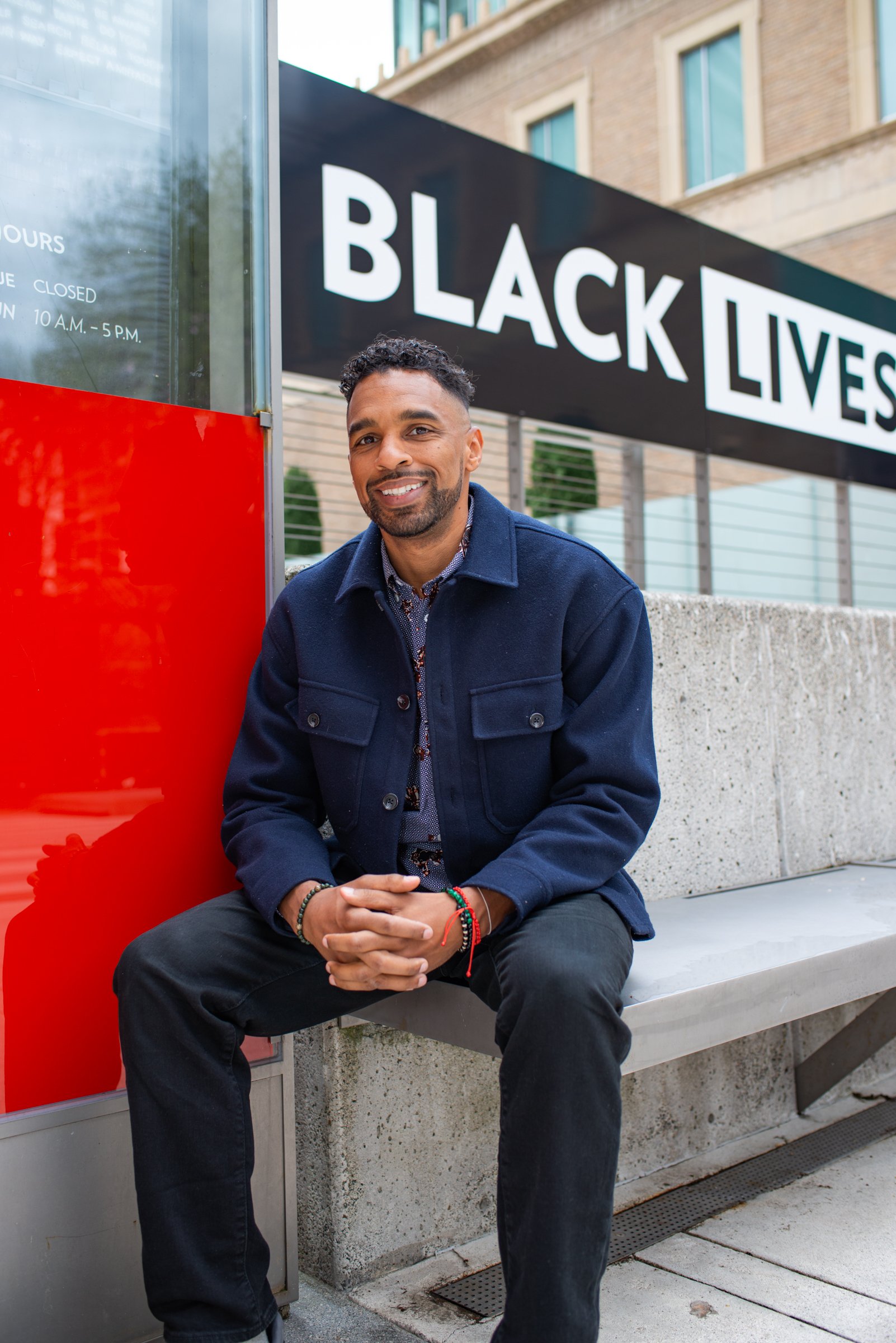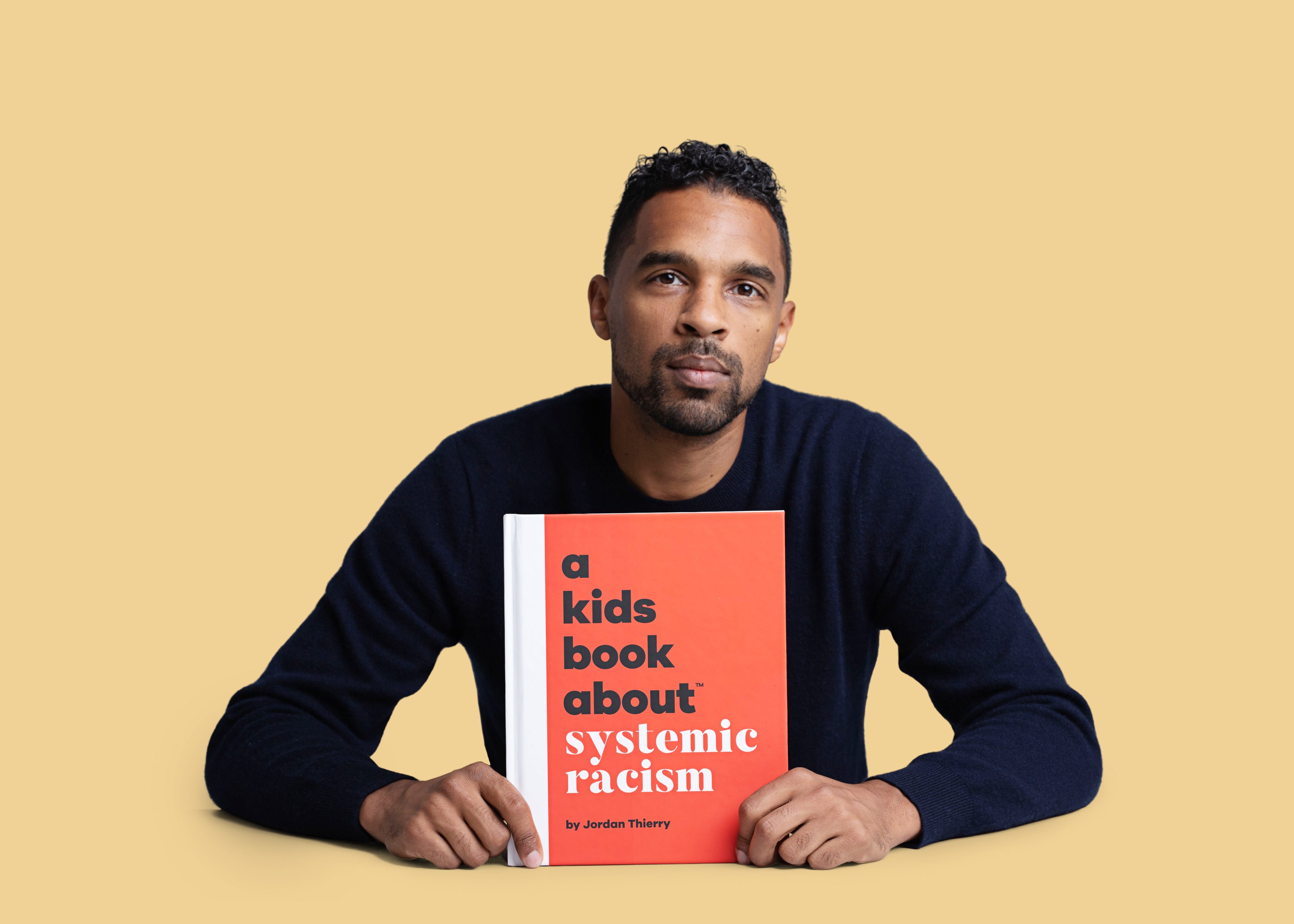
Social change through creativity
Jordan Thierry, BA ’05 (electronic media production) is a documentary filmmaker, author, creative director, and activist. Much of his work focuses on telling stories about Black people, history, and culture – stories he longed to see more of growing up in the Portland area in the ’80s and ’90s.
“Growing up in Portland and in Beaverton at that time period, as one of the only Black kids, I always was thirsty to see myself and my culture represented,” Thierry said. “With my parents being an interracial couple, I was very aware of race and of my otherness.”
With limited representation of Black male figures in his community and in the media, Thierry said he was grateful to have his father and his father’s friends to look up to.
“Thankfully the men in my life provided that supplemental sort of mentorship and examples of possibility of what it could look like to be a Black man walking in the world, how you carry yourself and the things that are important to you, and how you interact with people.”
By the time Thierry graduated from high school in 2001, content on the internet had become more widespread, providing greater access to information he hadn’t learned in the classroom.
“I really delved in deep to a lot of Black history that I wasn’t taught growing up in the public school system about my people, my culture, and about civil rights and the Black Power Movement,” Thierry said. “I started watching a ton of documentaries – two, three documentaries a day almost.”
Thierry moved to Illinois for college after high school, where he got his start in journalism hosting a radio show. However, the small school he attended didn’t offer a media production program, so he decided to return to Oregon and transfer to the UO as a junior, majoring in electronic media production with a focus on documentary filmmaking. Through this program, he produced his first documentary short film, Footprints in the Struggle: The Beatrice Cannady Story, which aired on the Oregon Public Broadcasting Network and was nominated for a student Emmy award.
 While at the UO, Thierry was also involved with several groups on campus, including the Black Student Union, UO chapter of the National Association of Black Journalists, and the Multicultural Center. He said it was during this time that his activism was born.
While at the UO, Thierry was also involved with several groups on campus, including the Black Student Union, UO chapter of the National Association of Black Journalists, and the Multicultural Center. He said it was during this time that his activism was born. “When I got connected to the Multicultural Center, that’s where I really learned what it meant to be an agent of change, how to pursue systemic changes, how to advocate within an institution, and how to organize people.”
After graduating from the UO in 2005, Thierry moved to Washington, D.C. to pursue a master’s degree in mass communication and media studies at Howard University. He said it was during this time that his whole world expanded, as he was immersed in Black life with exposure to people and cultures from across the African diaspora. It was during this time that he was inspired to begin work on his first full-length documentary, The Black Fatherhood Project.
“Living in Washington, D.C. there was at that time a lot of Black poverty. My mind was always in a state of wonder as to why we were faced with such high levels of poverty, why we were denied so much opportunity, and why our family structure looked different in a lot of ways,” Thierry said. “That was the impetus for starting The Black Fatherhood Project when I did. It was taking my own personal experience and then being in this very different place and being in this constant state of wonder around that.”
During his first summer of graduate school, Thierry rented a car and went on a long road trip with a friend, where the two interviewed Black fathers from across the country. It was his own community-based research project to tell a story he didn’t see anyone else telling at the time – how slavery, racism, and other challenges such as mass incarceration affect Black fatherhood and have contributed to fatherless Black homes.
“It was extremely challenging because here I am at this point, 23 years old, and I’m taking on what some could argue, and I would argue at that time too, was maybe one of the most pressing and misunderstood issues in Black America.”
With documentary filmmaking and other media work being Thierry’s side gig at the time, the film took him six years to complete. After graduation from Howard, a stint in New Jersey as a fourth-grade teacher, and then returning to Portland, he decided to finish the film.
After its release, many people asked him about creating a documentary that focused on the Black motherhood experience. As a biracial Black man with a White mother, Thierry said this wasn’t something he felt comfortable taking on and felt someone else could do better. However, it was partially these questions, along with the passing of his own grandmother in 2018, that spurred him to start work on his second full-length documentary, Grandma’s Roses.
The film explores the labor and love women invest in their families and communities, in the social context of patriarchy and gender inequity. Thierry said the intent of the project was to build understanding of the impacts gender injustice have had on women of color, while also paying tribute to his own and others’ grandmothers who lived full and rich lives in the face of racism and sexism.
“This is something we should be honoring, not in a superficial way, but in a way that actually we’re transforming the conditions that women are living in, so there’s more equality, more justice.”
 “I appreciated that the editorial team was completely supportive in saying what needed to be said in the book and not softening it to make the reality of the history less harsh than what it was,” Thierry said. “It’s a kid’s book, so we still kept it relatively simple, but I felt completely comfortable in talking about genocide, police violence, and kids being treated differently in school and being disciplined differently because of their race.”
“I appreciated that the editorial team was completely supportive in saying what needed to be said in the book and not softening it to make the reality of the history less harsh than what it was,” Thierry said. “It’s a kid’s book, so we still kept it relatively simple, but I felt completely comfortable in talking about genocide, police violence, and kids being treated differently in school and being disciplined differently because of their race.”Now, Thierry is writing a second book focused on his experience in a biracial family. He’s also working on a film about a historical female figure in Mexico’s fight for independence, a project he said is challenging him to do something less personal and focus more on his craft. In addition to these projects, Thierry balances other media production work as the owner and creative director of Dream Chase Media.
As he looks to the future and how to grow and improve his company, Thierry said he’s grateful for the people and opportunities that have helped him get where he is today – including his mentors from his time at the university.
“I want to express appreciation for all the incredible people that I learned from when I was at the UO,” Thierry said. “In the School of Journalism and Communication in particular, I had some really incredible, encouraging mentors. I had never met people who would support me in that way before in my life until I got there – people who really believed in me.”

